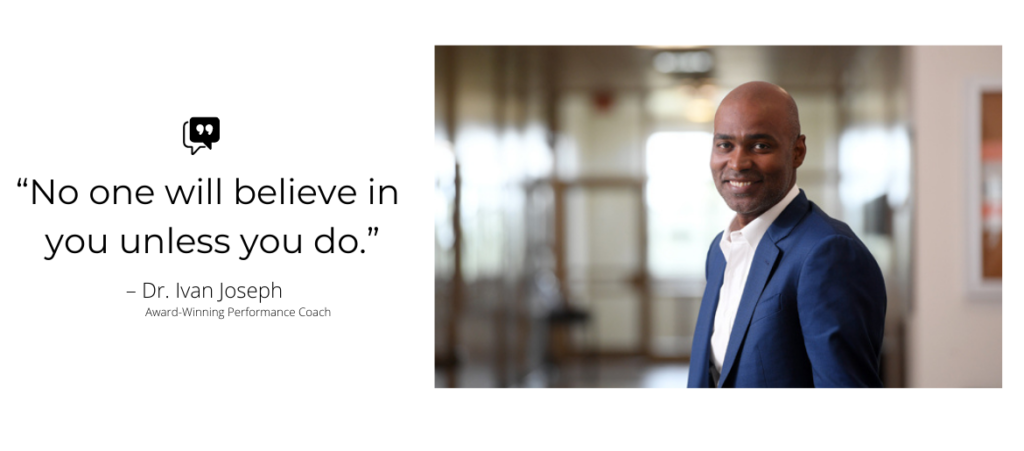
“No one will believe in you unless you do.” – Dr. Ivan Joseph.
Dr. Ivan Joseph is the Athletic Director at Ryerson University and the former head coach of the University’s varsity soccer team. He was one of the keynote speakers in TEDx Talks, and he shared how self-confidence is a skill and not an innate feature.
How did Dr. Joseph, an award-winning performance coach, perceived self-confidence?
From his personal experiences and as a head coach, he shares that a person’s most important skill is not agility, strength, or speed– it is self-confidence. He perceives that all your other skills will become useless without self-confidence because you will quickly lose sight or belief in yourself.
What good will your agility bring you if you easily get discouraged when you tumble down?
How can you describe a confident person?
Not everyone has the innate sense of self-confidence. People with low self-confidence have to undergo developing confidence to showcase. Low self-esteem may be due to personal experiences that have caused you to become shy and anxious to the public.
However, a person with self-confidence can:
- Do what is right; even unpopular opinions
- Willing to take risks
- Admits from mistakes and learns from them.
- Accepts a compliment.
- Optimistic
What is self-confidence?
Some confuse self-confidence with self-esteem and self-efficacy, but these terms have subtle differences. Self-efficacy is the confidence you gain from recognizing yourself, mastering skills, and achieving goals. It’s the type of confidence that encourages you to work hard and accept setbacks and difficulties.
Meanwhile, self-esteem is the general perception of oneself that one can cope with daily adversity. However, our self-efficacy and self-esteem may be affected if we do not have self-confidence. How can you master a skill if you are easily discouraged? Will you have self-esteem if you are easily hurt by criticism and rejection?
A person with self-confidence knows his strengths and weaknesses and views oneself positively. If you have self-confidence, you can handle criticism, be assertive with setbacks, and set realistic goals and expectations.
However, certain situations or experiences in life contribute to low self-confidence. Is it challenging to increase self-confidence?
Well, it depends. As Dr. Joseph said, self-confidence is a skill, and like with any other skills, you can learn and master it. There are a couple of ways to build self-confidence, and you need to do it step-by-step. There’s no magic button in mastering a skill.
How to build self-confidence
“The most beautiful thing you can wear is confidence.” – Blake Lively
You may have recognized your weaknesses, and you want to do better. Well, you will be better. But first, let’s focus on building your self-confidence.
Dr. Joseph shares 7 ways on how to build self-confidence.
- Unending repetition.
- Mix it with persistence. It doesn’t stop with one failure.
- Stop the negative self-talk.
- Stay away from people who bring you down.
- Make positive affirmations a habit.
- Write a brag letter.
- Reshape your perception.
If you feel unworthy, fearful, and doubtful, you need to try these steps and build your self-confidence.
Some of the small changes that will happen to your frame and mind has the most significant effect.
7 Ways on How to Build Self-confidence, According to Dr. Ivan Joseph.
1. Unending repetition.
There’s no shortcut to achieving success or mastering a skill. Remember Malcolm Gladwell’s 10,000-hour rule? That’s how long it will take.
Dr. Joseph reminisced the moment he recruited a goalie with stone-like hands. During their training, he cannot grip the ball. Instead of making the player feel bad about it, he made a simple solution for him.
He let him practice on the wall: kick the ball against the wall and catch it– repetitively.
In 8 months of 350 repetitions, a day, a calloused hand and rough hands made him a better player. Who will still say that successful people had it with luck? No, they had it with unending repetition.
A lot of practice will help you master a skill that later on helps you build self-confidence.
It’s human nature to be nervous, but you become less anxious if you keep on practicing before the event. That’s the power of repetition. It gives you familiarity making you less nervous.
2. Mix it with persistence.
But the real deal is– can you persist after the first pang of failure?
Some of us cannot repeat and practice because they bail after their first encounter of failure. How can you succeed if, at the first ounce of failure, you already gave up?
Dr. Joseph cited Thomas Edison and J.K. Rowling on this. Do you know how many tries Thomas Edison made to build the light bulb? 10,000 tries. Within that 10,000, he did not give up. How about the best-selling and successful Harry Potter series? Do you know how many times J.K. Rowling got rejected by publishers? About 12 or 13 times.
Both Thomas Edison and J.K. Rowling was quite persistent in succeeding. They repeatedly try, and if they fail, they do it again. If you are in their situation, how many failures can you take until you give up?
You can be confident at first, but after two or three rejections, that would hurt your ego. Right? But it’s different for Rowling; she mustered 12 rejections– J.K. Rowling was that persistent.
Maybe it shouldn’t be repetition alone; you should mix it with persistence. All of us can repeat things, but not all of us can persist through adversities. Now, that’s one way to build your self-confidence.
Thus, explore. Do what you think is best for you– and when you face some adversity, persist.
3. Stop the negative self-talk.
Do you recognize a voice in your head? That’s self-talk, and we all have that voice. However, you have to figure out what the voice tells you. Does it encourage you?
There are moments when we feel less of ourselves– have you experienced not having the confidence to answer a simple question? Do you feel unworthy? Are there days when you feel unattractive?
You do not need that negative self-talk. Do not add salt to the wound. Some people might have made you doubt yourself, and you do not need to add up. How we think, what we feed our minds, influences our actions. Stop the negative self-talk and practice positive self-affirmation.
“I am the captain of my ship and the master of my fate.” No one’s on the wheels but you. If you do not say and believe it, no one else will.
4. Stay away from people who bring you down.
A significant influence with negative self-talk is the people around us. Some people tear our self-perception.
The days you feel the greatest may be wrecked with one mistake. People will recognize what you did wrong, and when they do, they will talk about it, and soon enough, you begin to believe it. All the things that made you who you are go crashing down.
When your self-esteem is crashing down, how can you pick it up? A brag letter.
5. Write a brag letter.
A brag letter contains the list of what you are good at. Have a silent moment with yourself in front of a mirror and make a list of all the things that made you who you are today. All of the items on the list should be positive.
These are the moments you live for, and these are the experiences that bring you to who you are. It may be the moments when you are at the peak of your career, found the best partner in life, or it’s one of the best days of your life.
If you are going through doubts, fears, and anxiety, grab the brag letter you wrote. Read it time and time again. Remind yourself of the things you have already achieved. What’s important with having a brag letter is you can weather yourself through a bad storm.
6. Make positive affirmations a habit.
The same with your brag letter, positive self-affirmation is one of the perfect ways to build your self-confidence.
Did you know the story behind the brand Livestrong? It was Lance Armstrong’s self-affirmation. He wore a band with the phrase “live strong,” and if doubt and fear come to his mind, he moves the band from one arm to the next.
Aside from taking affirmations from yourself, you can build your self-confidence from others. Educators and coaches like Dr. Joseph know how. In his speech, he shared how he critically did it to one of his players.to do it effectively
When his player falls short on their performances, he tries to do it most subtly. He doesn’t pinpoint the mistake of the player. The player knows what he did wrong, and there’s no need to crush their self-confidence. Instead, Dr. Joseph appreciates and recognizes those who did it correctly.
Dr. Joseph did in the situation is boosting the other player’s confidence while the other isn’t being demoralized. If you praise and acknowledge the positive things instead of focusing on the negative ones, it breeds confidence in the people around you.
The claim is supported by a study conducted in Kansas. A football team was shown a video of their play, and they were bombarded with feedback and critics. However, from the baseline of their performance, there were no improvements.
Their coach changed the approach. Instead, the players were shown the moments when their performance was better. The next time they played, they made improvements.
As a coach or someone who wants to build their self-confidence, you need to change your approach to things. Catch them when they’re good. Don’t let negative vibes come your way.
7. Reshape your perception.
Lastly, your perception. We have already talked about this– your thoughts influence your actions. Thus, do not let your thoughts and emotions control you. Instead, you control them.
Self-confident people have their perceptions of things. They interpret feedback differently. They think the way they want.
Dr. Joseph reminisces how he asked his wife for a movie date, and he was rejected a couple of times. Although his wife gave him several hints that she doesn’t want to go out with him, Dr. Joseph was persistent. Whenever his wife declines, instead of lurking and saying there’s no chance. Dr. Joseph takes it a slight chance– and look at him now. He is happily married to the woman he used to annoy.
If you reshape your perception to positive things, your life will be filled with positivity too.
Practice building your self-confidence through these easy steps. We all want to succeed. However, if you are learning several news skills at once, you will only feel overwhelmed.
Recap on How to Build Self-Confidence
- Unending repetition. You have to perform the skill over and over again until you can do it without thinking. Make it into your subconsciousness.
- Mix it with persistence. It doesn’t stop with one failure. Working on a particular skill is not easy. There will always be hurdles on your way to success. Instead of giving up at the first failure, try again. Persist. Persevere amidst the adversities thrown at you.
- Stop the negative self-talk. You do not have to drag yourself with negative thoughts. Do not add more thoughts to your fears and doubts.
- Stay away from people who bring you down. Some people love to nitpick your mistakes. Even though you did 99 good deeds, they will judge you for a single mistake. Stay away from these types of people because what they say will influence your thinking, even if it’s not true. Sometimes, what people say crushes our self-perception and self-confidence.
- Make positive affirmations a habit. Instead of thinking negative thoughts, give yourself daily positive affirmations. Make it a habit. If you believe you can do it, then you can. You are the biggest supporter of yourself– no one else but you.
- Write a brag letter. On moments you feel great, write it down. You will need it to get through a storm in the future. Your brag letter keeps the things you thought are your achievements. When the day comes, you get upset, read your brag list, and remember how you became the person you are.
- Reshape your perception. The way you think greatly affects your emotions and actions. You can think differently from the others while building your confidence. We are all born different. Thus, whatever you do, do it with confidence.
Real progress in building your self-confidence is a slow and steady phase. You cannot change your perception and habits in a snap. If you are not happy along the way, you will easily quit and fall back to your old habits.
Are you still not feeling better?
Sometimes, the quick fix is not beneficial in the long run. If you feel bad and things don’t seem to improve, it’s best to seek professional help. Professionals such as psychologists and counsellors will help you further in developing strategies that will help you build up your confidence.
You may need help from experts who can understand any underlying problems that might cause you to feel bad about yourself.
Final Thoughts
Building self-confidence is a long journey. It’s an endless repetition, positive affirmations, and setbacks. But, what’s important is you persist.
While you are building your self-confidence, start with the small and simple steps. Do it step-by-step until you work your way toward mastering the complex skill of self-confidence. You can bookmark this page to visit it once in a while when you are feeling down.
What are you waiting for? Tune in and start today.
“Here’s to the crazy ones, the misfits, the rebels, the troublemakers, the round pegs in the square holes. We’re supposed to be different, folks. And when people look at us, believe in yourself.” – Dr. Ivan Joseph
References:
Featured image via Dalhousie University


